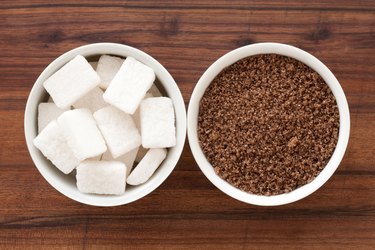
Most dieters try to avoid cookies, cakes, ice cream and other treats. After all, sugar turns into fat, doesn't it? Well, sugar metabolism is a little bit more complicated than that.
Tip
When consumed in excess, sugar turns into fat through a process called lipogenesis. Over time, high-sugar intakes may lead to weight gain, obesity, insulin resistance, diabetes and premature death.
Video of the Day
Sugar and Weight Gain
Hundreds of studies point to sugar consumption as a leading cause of obesity, heart disease and diabetes. According to a July 2017 review published in Translational Medicine, high sugar intakes contribute to dental caries, weight gain and obesity-related diseases. Researchers recommend limiting sugar to 10 percent of total calories to prevent these health issues. One gram of sugar has approximately 4 calories, meaning that a 2,000-calorie diet should provide no more than 50 grams of sugar per day.
Video of the Day
This sneaky ingredient may lead to weight gain and affect your heart and metabolism. In a large-scale study, participants who consumed 17 to 21 percent of their daily calories from sugar had a nearly 40 percent higher risk of dying from heart disease than those eating less sugar (8 percent of their daily calories). The odds of cardiovascular disease mortality were more than double in subjects who ate 21 percent or more of their calories from sugar.
As the scientists point out, soft drinks, fruit drinks and grain-based desserts are the primary sources of added sugar in the American diet. When consumed regularly, sugary foods and beverages may contribute to diabetes, obesity, elevated triglycerides, high cholesterol and inflammation. They also promote fat accumulation in the liver and may increase blood pressure. These findings were published in April 2014 in JAMA Internal Medicine.
Sugar is harmful to adults and children alike. According to a research paper featured in the journal Circulation in August 2016, added sugar may raise heart disease risk in children even when consumed in lower doses than the maximum daily recommended amount. Furthermore, this food ingredient may lead to non-alcoholic fatty liver disease, liver inflammation and insulin resistance in people of all ages.
How Sugar Turns Into Fat
Without a doubt, sugar is bad for your health — and your waistline. But what makes it so harmful? After all, it has just 4 calories per gram.
The best way to understand the connection between sugar and weight gain is to learn about sugar metabolism. After ingestion, this additive is converted to glucose and used for energy. Excess glucose is stored as glycogen in the muscles and liver.
However, these organs have a limited capacity to store glycogen. Your liver can store about 100 grams of glycogen, while your muscles may store anywhere between 350 and 700 grams, according to a December 2015 review in Nutrition & Metabolism.
If you eat more sugar than your liver and muscles can store as glycogen, the excess will be converted to fat and deposited into adipose tissue. This process is called lipogenesis. In other words, sugar turns into fat when consumed in large amounts.
Let's say that you eat a bowl of pasta and some ice cream. If your glycogen stores are already full, the excess sugar will be stored as fat. But if your glycogen stores are empty (such as when you're fasting or engaging in high-intensity workouts), your body will convert sugar to glucose and use it for energy. A part of it will be stored as glycogen, not fat.
All in all, sugar is unlikely to cause weight gain, heart disease or diabetes when consumed in moderation. The problem is that it hides in thousands of foods, so it's easy to go overboard without realizing it.
Ice cream, chocolate, pastries and candies are not the only sources of added sugar. Many seemingly healthy foods and drinks, such as fruit juices, ketchup, chocolate milk and cereals, are loaded with sugar and have little nutritional value. That's why it's so important to check food labels. In general, the amount of sugar is listed under carbs.
- Translational Medicine: "Obesity and Obesity Related Diseases, Sugar Consumption and Bad Oral Health: A Fatal Epidemic Mixtures"
- USDA: "Sugar"
- JAMA Internal Medicine: "Added Sugar Intake and Cardiovascular Diseases Mortality Among US Adults"
- Circulation: "Added Sugars and Cardiovascular Disease Risk in Children: A Scientific Statement From the American Heart Association"
- University of California San Francisco: "How the Body Metabolizes Sugar"
- Nutrition & Metabolism: "Glycogen Availability and Skeletal Muscle Adaptations With Endurance and Resistance Exercise"
- Diapedia: "Lipolysis and Lipogenesis"
- International Journal of Obesity: "Added Sugars and Risk Factors for Obesity, Diabetes and Heart Disease"